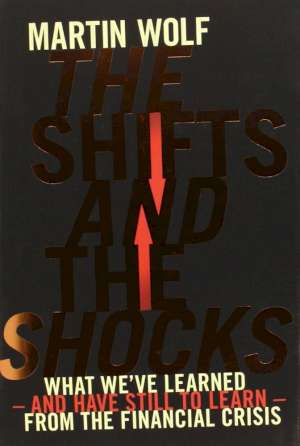31 March 2015
The Shifts and the Shocks
What we’ve learned - and have still to learn - from the financial crisis
Martin Wolf
2014, Allen Lane, 496 pages, £25
ISBN 9781846146978
Reviewer: Mark Cleary, Kinetic Economics

This book describes the recent financial crisis, the reasons underlying the crisis, the post crisis management (or ‘mismanagement’) and a range of potential policy solutions to avoid another, larger crisis.
In the first part of the book, Martin Wolf explains with some knowledge the causes of the crisis and the impact that it has had on the global economy. He clearly pinpoints the problems/arguments of loose monetary policy, saving gluts, the deregulation and liberalisation of financial markets, the conflicts of interest of the rating agencies, the rigidities of the Eurozone and of course the excessive current account surpluses and deficits that helped destabilise the financial system in the way that Michael Pettis had argued in his book The Great Rebalancing. Despite isolating what he believes to be the causes of the recent financial crisis, Wolf also proffers alternative views and theories contrary to his own and dismisses them for the most part most ably with convincing argument.
In terms of post crisis management Wolf sees the solutions adopted by many countries to the crisis as appropriately interventionist, albeit it not interventionist enough. He treats almost with contempt the view of the ‘liquidationists’ (the do-nothing, let them fail camp) and dismisses their destructive ‘self-healing’ views. However his belief, that although monetary policy was appropriately loosened post the crisis, fiscal policy was too tight for many countries and should have been used to stimulate growth rather than to retard it. This view is not without its critics, but it is also a view widely held.
His comments about the current ‘new’ monetary policies adopted are more interesting. These policies he suggests are simply designed to, “Restart the private-sector’s credit machine … (and that)…reliance on this surprisingly durable piece of conventional wisdom will lead to another and still bigger crisis.”
This type of analysis and comment demands alternatives and Wolf is only too happy to provide and discuss these. In the case of the Eurozone, he points out what we all know, that it is broken and needs reform. The surplus nations, notably Germany needs to do more to produce the consumption that is required by a surplus nation otherwise there will inevitably be unstable deficit countries within the currency area. The alternative we are now experiencing is the austerity based, structurally liquidationist policy of Germany on the other members of the Eurozone, a policy with deadly consequences. The solutions he suggests include a more adventurous policy by the ECB i.e. QE and negative interest rates (many of these policies are surprisingly now in place), the obvious, but unlikely, federal union, segmentation of the financial systems with exchange controls or perhaps, the end of the euro.
With regard to the global financial system he suggests that the financial systems stability should be put on a more secure footing by improving reserve requirements and by the proper funding of the regulatory regime. He suggests reform of taxation policy that currently favours debt and that corporate tax and says governance could be used to reduce the destabilising accumulation of savings by corporates and that financial contracts should adjust to reflect financial circumstances. Other policies are geared towards growth, redistribution of wealth and the taxation of ‘bads’ rather than effort.
Although Wolf suggests these policies, he also offers rather more interesting options to change in how the global financial system is ordered. For instance he suggests that individual countries’ financial systems and global liquidity need to be segmented, because then contagion and systemic risk would be reduced. Although the author accepts this may have consequences for liquidity and portfolio risk, he sees these as likely to be insignificant in terms of the benefits to stability. Although accepting that most of these more radical solutions are unlikely, he thinks current policies will be ineffective and mean another crisis is likely.
Finally he writes about a message for the ‘elite’. He suggests that the elite have failed their citizens and that the costs of the crisis have not fallen equally. The failure of the elite to understand the consequences of how they have acted has managed to weaken democracy: “…[D]ivorce between accountability and power strikes at the heart of democratic governance.”
